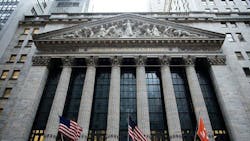The Dow Jones Industrial Average, the most famous equity index benchmark on Wall Street, shot above 20,000 for the first time on January 25.
The blue-chip stocks index quickly blew through the much-anticipated milestone in the opening seconds of trading and continued to gain as the morning progressed.
The new record culminates a U.S. rally begun in the wake of U.S. President Donald Trump's election, in anticipation he will produce pro-growth policies, but which had stalled in the weeks leading up to the inauguration.
The surge was the latest sign that investors are brushing aside worries about Trump's bent towards trade protectionism and divisive social policies as it fixates on expectations the White House and Republican Congress will produce tax cuts, infrastructure spending, and reduced regulations.
Nearly 90 minutes into trading, the Dow had reached 20,065.16, up 0.8% or more than 150 points above close on January 24.
The broad-based S&P 500 rose 0.6% to 2,294.67, while the tech-rich Nasdaq Composite Index gained 0.8%t to 5,643.90. The S&P 500 and the Nasdaq each closed at all-time records on January 24.
Sam Stovall, chief investment strategist at research firm CFRA, said it was a "monumental day." He said the market could retreat somewhat, but would not fall sharply.
JJ Kinahan, chief market strategist TD Ameritrade, hailed the news, posting a picture to his Twitter account showing him toasting "Dow 20K" with a glass of champagne, although the milestone may be largely symbolic.
"It's exciting, but in the grand scheme, I don't think it means much," Kinahan said.
While the Dow still resonates as a sign of the strength of the economy to broad U.S. society, investment professionals follow the S&P 500 more closely, which also is at record levels, he said.
Key gainers in the 30-member Dow included Boeing, which rose 3.9% after reporting better-than-expected fourth-quarter earnings; and Caterpillar, which gained 2.1% ahead of its earnings report Thursday. United Technologies fell 2%, which slightly beat expectations.
Bullish Momentum Returns
In crossing the 20,000 threshold after many failed tries, the market regained its mojo after the rally spurred by Trump's election stalled in mid-December and up to the January 20 inauguration.
Analysts said the shift was triggered by Trump's announcements on September 24 to advance two major pipeline projects that had been blocked by former president Barack Obama.
The pipeline move "wasn't a surprise as it was consistent with campaign rhetoric, yet it was a timely reminder for a listless market of the Trump administration's push to increase economic activity in the U.S.," said Briefing.com analyst Patrick O'Hare.
The rally spurred more stock buying by investors who were caught off guard in what O'Hare dubbed "FOMO" or the "fear of missing out."
Of the major policies being contemplated, analysts are most excited about tax cuts, which could have a direct impact on lifting corporate profits, and enhanced public works spending, which could boost U.S. growth.
Market Shrugs at Controversy
The renewed market confidence suggests investors are shrugging off worries about Trump, which include fears he will ignite a trade war with protectionist policies and push hard on controversial social policies.
Trump announced on January 25 that he would seek a probe into what he calls widespread voter fraud in the election that brought him to power, hammering away at allegations widely dismissed as baseless.
Trump was expected later on January 25 to announce the first steps towards building a massive wall on the Mexican border, a campaign promise that pleased his political base but has been criticized by others as unnecessary and mean-spirited, as well as a misuse of funds.
Analysts have likened hostility to Trump by many in the broader society to opposition that confronted Ronald Reagan when he was elected in the 1980s. Markets generally do not react to social strife unless it is on a monumental scale.
Kinahan said some of Trump's controversial policies, such as trade protectionism, may be "bargaining chips" as his agenda moves through Washington.
"He's been in real estate his whole life so he's all about compromise," he said. "The more things you throw out, the more bargaining chips you have.
Kinahan said investors also are hedging in case the market pulls back, a shift that is most visible in the popularity of "put" options that stocks will fall.
By John BIERS
About the Author
Agence France-Presse
Copyright Agence France-Presse, 2002-2025. AFP text, photos, graphics and logos shall not be reproduced, published, broadcast, rewritten for broadcast or publication or redistributed directly or indirectly in any medium. AFP shall not be held liable for any delays, inaccuracies, errors or omissions in any AFP content, or for any actions taken in consequence.
